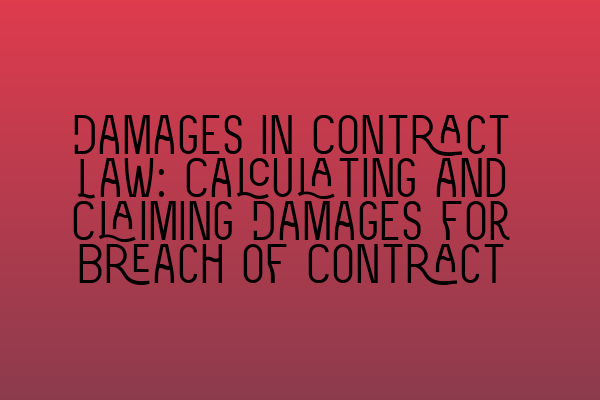Damages in Contract Law: Calculating and Claiming Damages for Breach of Contract
Introduction
In contract law, damages refer to the monetary compensation awarded to a party who has suffered a loss due to a breach of contract by the other party. When a breach of contract occurs, the innocent party is entitled to be put in the position they would have been in if the contract had been performed correctly. The purpose of this blog post is to provide a comprehensive guide on calculating and claiming damages for breach of contract, including the factors that affect the calculation and the steps involved in making a claim.
Calculating Damages
1. Compensatory Damages
Compensatory damages aim to compensate the innocent party for their actual losses caused by the breach of contract. This can include both direct and indirect losses. Direct losses are the immediate consequences of the breach, such as the cost of replacing defective goods. Indirect losses, also known as consequential or special damages, are the losses that arise as a result of the breach but are not directly caused by it. These can include lost profits, additional expenses incurred, or reputational damage.
2. Expectation Damages
Expectation damages are a type of compensatory damages that aim to put the innocent party in the position they would have been in if the contract had been performed according to its terms. This involves calculating the difference between the actual performance and the expected performance under the contract. The innocent party is entitled to recover the amount necessary to achieve the position they would have been in.
3. Liquidated Damages
Some contracts contain a provision known as a liquidated damages clause, which specifies in advance the amount of damages to be paid in the event of a breach. These clauses are enforceable if they represent a genuine pre-estimate of the loss likely to be suffered as a result of the breach. If the specified amount is extravagant or unconscionable, the court may reduce it to a reasonable amount.
4. Mitigation of Damages
The innocent party has a duty to mitigate their losses by taking reasonable steps to minimize the impact of the breach. They are not entitled to recover damages for any losses that could have been prevented through reasonable actions. The burden of proof is on the breaching party to show that the innocent party failed to mitigate their damages.
Claiming Damages
1. Notification of Breach
The innocent party must notify the breaching party of the breach as soon as possible. This notification should be in writing and should clearly state the nature of the breach and the losses suffered as a result. Failure to provide timely notice may limit the innocent party’s ability to claim damages.
2. Calculation of Damages
The innocent party should carefully calculate their damages, taking into account both direct and indirect losses. It is advisable to seek professional advice from a solicitor to ensure an accurate calculation of damages.
3. Negotiation and Settlement
Before initiating legal proceedings, it is often beneficial to attempt to negotiate a settlement with the breaching party. This can save time, costs, and preserve business relationships. A skilled solicitor can play a crucial role in negotiating a favorable settlement on behalf of the innocent party.
4. Court Proceedings
If a settlement cannot be reached, the innocent party may need to commence court proceedings to claim damages. It is essential to engage a solicitor experienced in contract law to guide you through the process and present a strong case in court.
Conclusion
Calculating and claiming damages for a breach of contract is a complex process that requires careful consideration of various factors. It is crucial to accurately calculate the damages and follow the necessary steps to ensure a successful claim. Seeking professional advice from a solicitor specializing in contract law is highly recommended to protect your interests and maximize your chances of obtaining fair compensation.
For more information about legal practice, decision-making, solicitor salaries, client relationship management skills, law school education, and securing training contracts, please refer to the following related articles:
– Unveiling Real-Life Case Studies: Insights into Legal Practice and Decision-Making
– Exploring Solicitor Salaries in the UK: Average Earnings and Factors Affecting Income
– Mastering Client Relationship Management: Skills for Solicitors to Enhance Trust and Loyalty
– Pursuing a Law School Education in the UK: Choosing the Right Path for Your Future
– Securing Training Contracts: A Roadmap to Becoming a Solicitor
